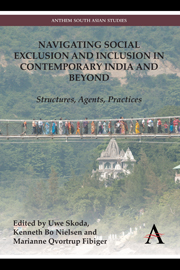 Navigating Social Exclusion and Inclusion in Contemporary India and Beyond
Navigating Social Exclusion and Inclusion in Contemporary India and Beyond Book contents
- Frontmatter
- Contents
- Acknowledgements
- List of Contributors
- 1 Introduction: Navigating Exclusion, Engineering Inclusion
- Part I Spaces and Values
- Part II Communities and Politics
- Part III Resources and Development
- 10 Dams, Development and the Exclusion of Indigenous Groups: A Case from Odisha
- 11 ‘Solutions Emerge When Everyone Works Together’: Experiences of Social Inclusion in Watershed Management Committees in Karnataka
12 - The Death of Shankar: Social Exclusion and Tuberculosis in a Poor Neighbourhood in Bhubaneswar, Odisha
from Part III - Resources and Development
Published online by Cambridge University Press: 05 September 2013
- Frontmatter
- Contents
- Acknowledgements
- List of Contributors
- 1 Introduction: Navigating Exclusion, Engineering Inclusion
- Part I Spaces and Values
- Part II Communities and Politics
- Part III Resources and Development
- 10 Dams, Development and the Exclusion of Indigenous Groups: A Case from Odisha
- 11 ‘Solutions Emerge When Everyone Works Together’: Experiences of Social Inclusion in Watershed Management Committees in Karnataka
Summary
It was a simmering hot summer day and Rosalyn, my research assistant, and I were standing together with Shankar and a number of fellow ‘Pradhans’ (name of a Scheduled Tribe (ST)) in the middle of an archetypical village scene with the clay houses so typical of small villages in rural Odisha; and yet, we were in the middle of the state capital of Bhubaneswar in one of the resettlement colonies that had grown as rural–urban migration took off in the latter half of the twentieth century. We discussed Shankar's tuberculosis (TB) and his continuous inability to follow the new TB treatment that had recently been introduced in the capital. Because he did not turn up at the clinic to get his medicines according to the schedule, the doctor had stopped his treatment. Now he had a fever, but he insisted that it was caused by the rain. I offered to accompany him to see the doctor on the following day – just before I had to leave India for a longer stretch of time – to help ensure that he was put back on treatment, and the small crowd of concerned family and friends surrounding this public discussion strongly supported the idea. But Shankar did not. I said, ‘It's your decision; it's your life, if you want me to help you, I'll go with you on Monday morning, but if you don't want it, I can't help you.’
- Type
- Chapter
- Information
- Navigating Social Exclusion and Inclusion in Contemporary India and BeyondStructures, Agents, Practices, pp. 207 - 226Publisher: Anthem PressPrint publication year: 2013
